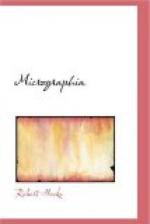It would be somewhat too long a work for this place Zetetically to examine, and positively to prove, what particular kind of motion it is that must be the efficient of Light; for though it be a motion, yet ’tis not every motion that produces it, since we find there are many bodies very violently mov’d, which yet afford not such an effect; and there are other bodies, which to our other senses, seem not mov’d so much, which yet shine. Thus Water and quick-silver, and most other liquors heated, shine not; and several hard bodies, as Iron, Silver, Brass, Copper, Wood, &c. though very often struck with a hammer, shine not presently, though they will all of them grow exceeding hot; whereas rotten Wood, rotten Fish, Sea water, Gloworms, &c. have nothing of tangible heat in them, and yet (where there is no stronger light to affect the Sensory) they shine some of them so Vividly, that one may make a shift to read by them.
It would be too long, I say, here to insert the discursive progress by which I inquir’d after the proprieties of the motion of Light, and therefore I shall only add the result.
And, First, I found it ought to be exceeding quick, such as those motions of fermentation and putrefaction, whereby, certainly, the parts are exceeding nimbly and violently mov’d; and that, because we find those motions are able more minutely to shatter and divide the body, then the most violent heats menstruums we yet know. And that fire is nothing else but such a dissolution of the Burning body, made by the most universal menstruum of all sulphureous bodies, namely, the Air, we shall in an other place of this Tractate endeavour to make probable. And that, in all extreamly hot shining bodies, there is a very quick motion that causes Light, as well as a more robust that causes Heat, may be argued from the celerity wherewith the bodyes are dissolv’d.




